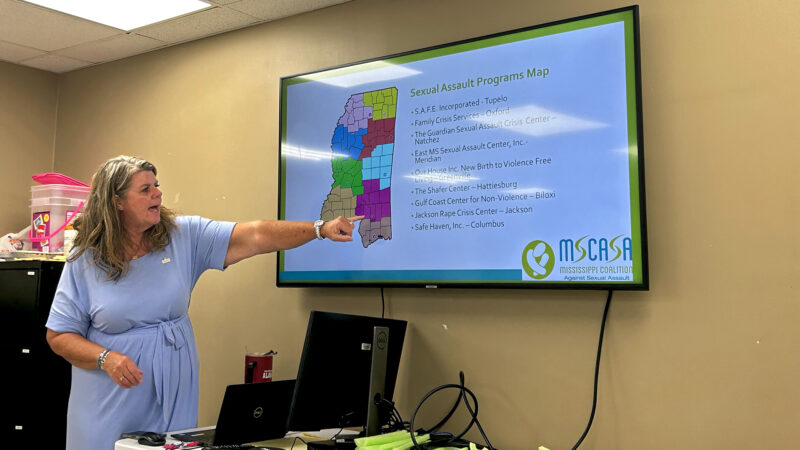This free training aims to address the Gulf South’s shortage of sexual assault nurses
Shalotta Sharp explains sexual assault programs in Mississippi to a group of nurses training to become sexual assault nurse examiners in Meridian, Mississippi, on July 8, 2024.
It’s Monday morning, July 8, in Meridian, Mississippi. Seven nurses from across the Gulf South are sitting around plastic tables set up in a small room down the hall from the Intensive Care Unit at Ochsner Rush Medical Center.
They’re tired, but they’re nurses — they’re always tired.
They sip coffee and chat quietly; mentally preparing for a long week of training to become sexual assault nurse examiners, or SANEs.
“How many of you learned about the SANE program or SANE nursing or forensic nursing in nursing school?” asks their instructor, Shalotta Sharp.
Not a single hand goes up.
“Me either,” Sharp says. “Forensic nursing is the best kept secret in the nursing community, in my opinion.”
SANEs are specialized nurses who conduct forensic exams and collect potential evidence as part of a sexual assault forensic exam (SAFE) kit — what used to be called a “rape kit.” Most sexual assaults that are reported don’t lead to a conviction. A forensic exam from a SANE could improve the chances of prosecution.
But there’s a huge shortage of SANEs — across the country, but especially in the Gulf South. According to the Commission for Forensic Nursing Certification, which maintains a directory of SANE-certified nurses, Alabama has 44 certified SANEs for the entire state. Louisiana has 42. Mississippi only has 8 — for a population of almost three million.
Sharp is here in Meridian to boost those numbers. She’s a SANE with the Mississippi Coalition Against Sexual Assault. She says it can be tough for nurses to get time off or pay for extra classes. That’s why this course is free.
Sharp starts by dispelling myths about the course — the main one being that they’ll be spending the week learning how to do the SAFE kit.
“That’s what I get when I teach this class a lot, is ‘I want to learn 40-plus hours of how to operate a Q-tip,” Sharp says. “If you can operate a Q-Tip, then you know how to do the kit. The kit is so simple. It is a tiny component of what you’re going to be learning this week.”
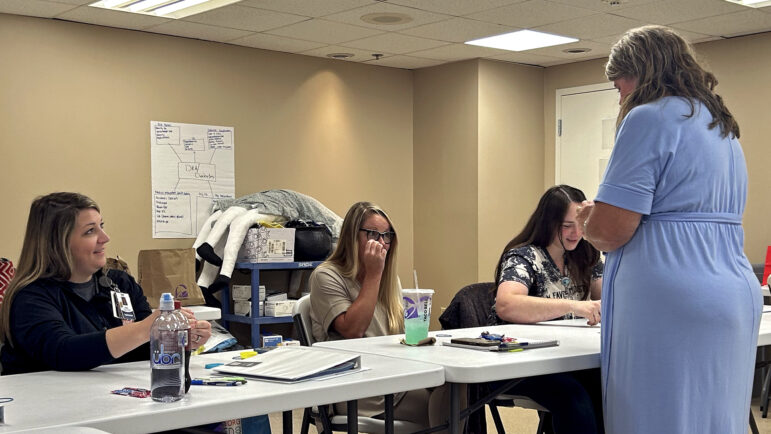
Any nurse can do a forensic exam, Sharp says. What makes a SANE special is the holistic, trauma-informed care they provide sexual assault patients. Care that can address both physical and emotional needs. In addition to an exam that is more sensitive and understanding, SANEs will follow up with patients and connect them with support services.
That’s why these seven nurses are here. They all volunteered for this training — and for different reasons. An icebreaker prompt that the nurses answer at the start of the program is, “Why am I taking this course?”
“I volunteered to do this because nobody else wanted to do it,” says Jane Koen, a nurse from Alabama.
Koen has been a nurse for almost 37 years. She says they don’t have any SANEs at her hospital and she wants to be able to offer this care. Only 17-20% of American hospitals employ a sexual assault nurse examiner.
Other nurses talked about how they’re worried about making mistakes when a sexual assault patient comes into the ER. They want to get it right.
For nurse Jennie Cochran, it’s personal. She tears up as she details someone close to her being assaulted, not getting this kind of care and being treated like a criminal by the police for seeking help.
“So this is near and dear to my heart,” Cochran says. “And how I would like to be an advocate for those who don’t have a voice.”
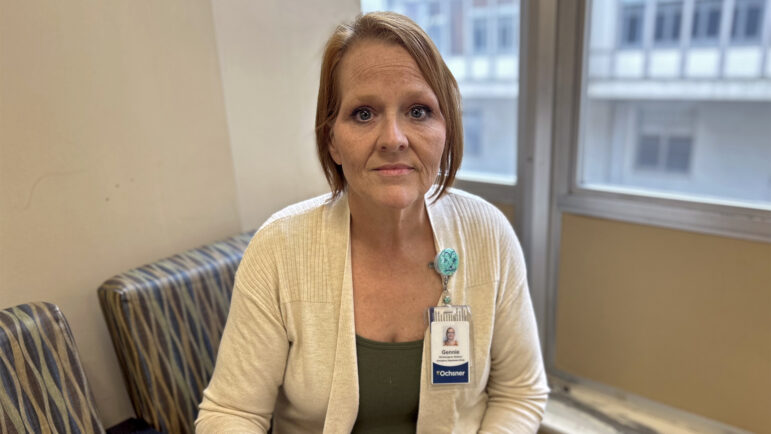
Throughout the course, the nurses learn everything from basic anatomy to exam and interview techniques to working with vulnerable populations like human trafficking survivors.
Compassion lies at the heart of their care. Exams can take hours, and SANEs — and advocates they may call to help support — will be with the patient every step of the way.
At the end of the week, there’s a mock trial. In a real courtroom. With real lawyers. Because SANEs can be qualified as experts and testify in court.
None of the nurses look forward to this.
In Courtroom A, at the Lauderdale County Courthouse, they fidget and squirm in their seats while Assistant District Attorney Cory Griffin, who’s playing the part of the judge today, gives them the lay of the land, pointing out the witness stand, jury box, where the defendant sits and so on.
One by one, each of the nurses is called to the stand by Assistant DA Kate Martin, who’s acting as prosecutor for the proceedings.
“The state calls Gennie Cochran,” she says.
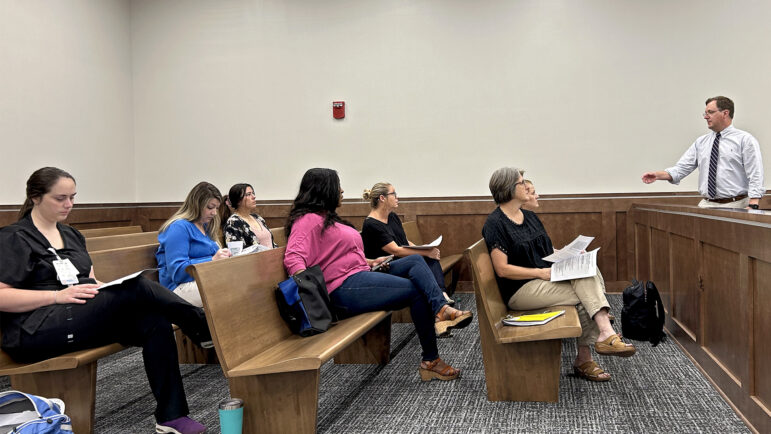
Cochran takes a breath and nods at the words of encouragement offered by her fellow nurses in the benches. She makes her way to the stand, swears to tell the truth, the whole truth, and nothing but the truth. Then, Martin questions her about a fictional case the nurses had a chance to review — just like they would during direct testimony in a real trial.
“Miss Cochran, what color were the bruises that you observed?” Martin asks.
“Reddish blue,” Cochran answers.
Then comes the cross-examination.
Another assistant DA, Erich Jerscheid, posing as a defense lawyer, presses Cochran, trying to trip her up.
“Let me cut to the chase,” Jerscheid says at one point, ramping up the pressure. “You weren’t there when it happened, is that right?”
“Yes,” Cochran says.
“You saw nothing,” Jerscheid says.
“Right,” says Cochran.
“So you would agree with me that patients are not entirely truthful with their healthcare provider?” Jerscheid asks.
“Yeah,” Cochran says. “Some lie.”
This part can feel intimidating for the nurses. In fact, many nurses say it’s this fear of potentially having to testify in court that keeps some from becoming SANEs in the first place. They don’t want to make a mistake that could cost someone’s case — and they don’t know if they can handle the pressure of the courtroom.
After her testimony, the nurses get feedback from the pretend judge, the other lawyers and the instructors — tips on how to keep their cool and when they can push back. And then, it’s over.
“This is the part I was the most scared of,” Cochran says as she’s dismissed from the stand.
“Well, you did great,” Griffin, pretend judge, says.
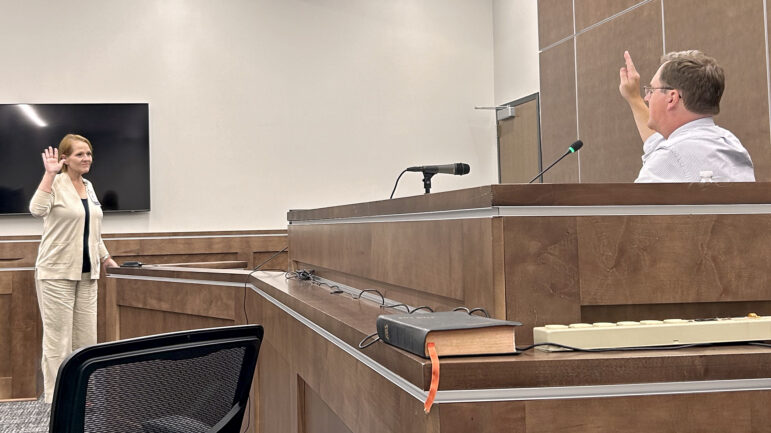
Cochran and the other nurses said this training has definitely given them the tools they need to provide care to their sexual assault patients. It also made court feel less scary.
Now, she’s ready to bring what she’s learned to her patients — and spread the word to other nurses.
“I really, really learned a lot this week, and I also learned how great of a need there is, that there’s more of a need than there are resources or people to actually take care of these people,” Cochran said. “So, hopefully through education, we can get more people on board.”
Cochran said that, for her, the most important part of being a SANE is the compassionate care they provide, and how it can help avoid re-traumatizing a patient who has just experienced the worst.
And after this week, the South now has seven more nurses able to provide that care.
This story was produced by the Gulf States Newsroom, a collaboration between Mississippi Public Broadcasting, WBHM in Alabama, WWNO and WRKF in Louisiana and NPR. Support for health equity coverage comes from The Commonwealth Fund.
U.S. and Iran to hold a third round of nuclear talks in Geneva
Iran and the United States prepared to meet Thursday in Geneva for nuclear negotiations, as America has gathered a fleet of aircraft and warships to the Middle East to pressure Tehran into a deal.
FIFA’s Infantino confident Mexico can co-host World Cup despite cartel violence
FIFA President Gianni Infantino says he has "complete confidence" in Mexico as a World Cup co-host despite days of cartel violence in the country that has left at least 70 people dead.
Supreme Court appears split in tax foreclosure case
At issue is whether a county can seize homeowners' residence for unpaid property taxes and sell the house at auction for less than the homeowners would get if they put their home on the market themselves.
Top House Dem wants Justice Department to explain missing Trump-related Epstein files
After NPR reporting revealed dozens of pages of Epstein files related to President Trump appear to be missing from the public record, a top House Democrat wants to know why.
ICE won’t be at polling places this year, a Trump DHS official promises
In a call with top state voting officials, a Department of Homeland Security official stated unequivocally that immigration agents would not be patrolling polling places during this year's midterms.
Cubans from US killed after speedboat opens fire on island’s troops, Havana says
Cuba says the 10 passengers on a boat that opened fire on its soldiers were armed Cubans living in the U.S. who were trying to infiltrate the island and unleash terrorism. Secretary of State Marco Rubio says the U.S. is gathering its own information.

